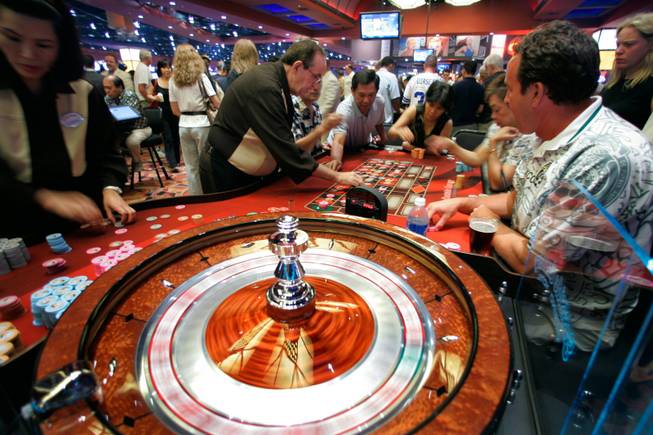Monday, June 3, 2013 | 2 a.m.
Sun coverage
A bill to legalize online poker after Congress failed to do it? Check.
A bill to protect big casino resorts from slot machine parlors and bars with sports betting kiosks? Check.
A $233 million lawsuit settlement that eliminates a disputed tax on comped meals? Check. (Well, almost check, the bill hasn’t yet been passed by the Senate but appears poised to do so.)
“So far, it’s been an OK session,” said Pete Ernaut, lobbyist for the Nevada Resort Association, who has been at the helm of many of the industry’s legislative initiatives this year.
These days, it’s good to be a gaming lobbyist.
The state’s most powerful industry is poised to come out of this legislative session the victor in a number of key battles that it asked lawmakers and Gov. Brian Sandoval to broker for them.
The industry racked up its first win early in the session, when the Senate and Assembly unanimously passed an online poker bill that was signed immediately by Gov. Brian Sandoval.
The entire process, from hearing to signature, took seven hours. Sandoval declared it a “historic day.”
Next up, a bill that would prohibit sports betting on kiosks, an emerging technology proliferating in Las Vegas bars and taverns that big resorts saw as a threat to their bottom line.
The measure, Senate Bill 416, also imposes new requirements on so-called slot parlors such as Dotty’s, which have been offering gambling without any other real business operation.
“The nonrestricted people, they came out like bandits,” said Sen. Tick Segerblom, D-Las Vegas. “The restricted guys, they are the big losers.”
Ernaut argued at the time that hotel resorts, which are required to make significant investments, including building 200 hotel rooms, in exchange for a nonrestricted gaming license, are in danger from smaller gaming operations who aren’t subject to as many requirements. Restricted gaming licenses are supposed to be reserved for a business that offers gambling that’s “incidental” to its primary activity.
“Protection of this industry: There can’t be a higher priority of this body than getting the No. 1 industry in this state right,” Ernaut said during one of the hearings.
That rankled some lawmakers, but the sentiment was generally shared under the oft-repeated premise that what’s good for the state’s biggest industry is good for the state.
“I think the Legislature has the primary duty to meet the needs of the citizens,” said Sen. Ben Kieckhefer, R-Reno. “But a thriving gaming industry is certainly a component of that.”
“I agree that we absolutely have to look out for the well-being and viability of the gaming industry,” said Sen. Greg Brower, R-Reno. “But not at any cost. We have to strike the right balance, and I think we’ve done that.”
Senate Bill 416 passed the Assembly unanimously and the Senate with only three opposed. It’s pending Sandoval’s review.
The industry’s last task: passage of a long-fought settlement of a $233 million court case on whether casinos should pay sales tax on the free meals they comp employees and patrons.
The battle, which dates to 2003, has been the subject of lawsuits, conflicting court opinions and intense behind-the-scenes settlement negotiations. The case is now before the Nevada Supreme Court.
The result: Casinos will stop pursing $233 million in refunds on taxes they’ve already paid in exchange for lawmakers passing a law that free meals for employees and customers are not subject to the sales tax.
In the last days of the session, lawmakers introduced just that bill, which passed the Assembly unanimously and appears poised to pass the Senate.
Sandoval, whose staff helped negotiate the settlement, backs the move as a way to protect the state from a massive liability that could blow a hole in the budget if the Supreme Court ruled against the state.
Not all lawmakers are happy about the settlement.
“It’s a settlement, so I’ll probably vote for it,” Segerblom said. “But it’s really disappointing they didn’t let the court decide. That’s a huge amount of money we’ve historically made the hotels pay. To let them off the hook is really a disservice, and we should revisit it.”
But if the Legislature revisits it before 2019, the state would be in breach of contract and would be forced to pay a pro-rated portion of the $233 million back to casinos, according to the settlement.
Many lawmakers, however, think the settlement is a good deal for the state, which will no longer be under the threat of the $233 million liability.
“I don’t have a problem deeming (the meals) untaxable,” Kieckhefer said.


Join the Discussion:
Check this out for a full explanation of our conversion to the LiveFyre commenting system and instructions on how to sign up for an account.
Full comments policy